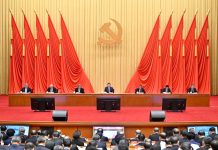On July 22, the Across the Pacific: China-U.S. Youth Dialogue for a Shared Future program officially came to a close in Shanghai. Over the course of two and a half weeks, 25 young delegates, brought together by the International Student Conferences’ Fifth China-America Student Conference, traveled across Beijing, Xi’an in Shaanxi Province, Suzhou in Jiangsu Province and Shanghai–bridging cultures, sharing ideas and building friendships. In an exclusive interview with Beijing Review reporters Peng Jiawei and Tao Zihui at the closing ceremony, the delegates reflected on how people-to-people exchanges have deepened their understanding of China, reshaped cross-cultural perspectives and forged lasting human connections.

The dialogues
Michael Buzzy: This conference has forever left an indelible mark on my soul, and I feel very privileged for the opportunity and also am extremely honored to have been able to participate.
For me, the [Future China-U.S. Diplomats] Summer Camp [from July 16 to 18] was the most impactful part of the entire conference. Just the ability to connect with so many passionate, intelligent and caring individuals and to work on shared solutions around topics that impact all of us, the ability to work in a cross-cultural manner on bilateral issues for a more hopeful future, was one of the most amazing experiences of my life.
You can travel, see extraordinary places and have all kinds of fun—but if you leave a place without truly connecting with its people, the experience can feel incomplete. For me personally, it was those connections, as well as the ability to look back and know I had truly meaningful, substantive conversations, that made this the most enriching and full-hearted experience I could have hoped for.
So next time I come back, it will feel almost like coming home.
Wang Yiran: This program feels like a true highlight of my life. It was one of the most beautiful and unforgettable memories I will ever carry with me.
Like Michael, my favorite part was the summer camp, where Chinese delegates were assigned to represent the United States and American delegates took on the role of representing China. It was a brilliant design that encouraged us to step into each other’s shoes, articulate views from the other side and confront shared challenges from a place of empathy and mutual understanding.
Zhang Chenglin: The most memorable moment for me was our visit to the Blue Hall at the Ministry of Foreign Affairs (MFA), where we had a thoughtful and engaging conversation with spokesperson Mao Ning. It was an experience so vivid and moving that I know it will stay with me for years to come.
Li Zeming: As someone who is deeply interested in China’s foreign diplomacy and international relations, I have followed daily news briefings very closely and have watched tons of short clips of the MFA’s regular press conferences.
And so when I stepped into the Blue Hall for the first time and saw the familiar setting in real life, I was beyond words.
Li Liao: I’ve always dreamed of becoming a diplomat, so meeting Mao Ning in person felt like a dream come true. She was gentle but also incredibly firm—a powerful reflection of the strength of China’s global presence.
Samuel King: One of the most meaningful moments of the trip was our visit to the U.S. Embassy in Beijing. As someone aspiring to work in the U.S. Government and contribute to improving U.S.-China relations, it was an especially meaningful experience. Hearing from the diplomats about their careers and their perspectives on the current state of bilateral relations was truly inspiring.
Shu Xin: This student-led program allowed young people from both countries to see each other beyond the common stereotypes. Some U.S. delegates came in thinking that Chinese students were more reserved or reluctant to speak up. But after just a few days of exchange, they discovered a wealth of shared interests—and found their Chinese counterparts to be articulate, warm and eager to engage.
Liu Yuxuan: Beyond the academic discussions, we also talked about the cultural differences between China and the U.S., as well as the many rich traditions embedded in contemporary Chinese culture.
During our trip, mealtimes often provided a key space for informal exchanges: Our American peers would ask about the names and ingredients of each dish, and we would explain to them the complex web of customs and cultural symbolism behind these delicacies. Through these small conversations, we are not only forming genuine friendships but also fostering a better environment for dialogue between our countries.
Min Boyuan: We believe that communication and exchange between young people can transcend political divides and cultural boundaries.
Though we may differ from our American counterparts in culture and values, we found common ground in the way we engage with one another and in our shared vision for the future. We all care deeply about protecting the environment, we all hope to see people living better lives, and we all aspire to a world that is grounded in equality and mutual respect.
The places
Dahlia Townley-Bakewell: It might be a bit strange—I’ve been studying Chinese for six years, but this is my first time visiting China’s mainland. I’ve always been very eager to learn more about the country, so I’m truly happy that I finally have the chance to be here and to use the language I’ve been learning for so long.
Krislyn Massey: China is a beautiful country. Though I became known for liking all the things most people don’t like about China, such as douzhi (a fermented mung bean beverage native to Beijing) and snacks that others tend to turn away from, it was precisely these experiences that helped me create my own unique memories, which I now get to share with others.
One of my unique memories was getting lost in Beijing and asking the police to help me. It was amazing to see how the police in another country can help not only their own citizens, but foreigners as well, since that’s a treat you don’t see very often.
Henry Collins: What I remember most from China is visiting these incredibly advanced cities. I live in a really small town with about 3,000 people, so being in a city like Beijing or Shanghai felt almost surreal. It’s something that will really stick with me.
I’m already looking into ways to come back—whether through an internship or a job teaching English. I don’t see this being my last time in China. I’m really excited about the idea of coming back.
Hannah Kim: My favorite moment was taking one of those shared bicycles and riding down the streets of Shanghai, just driving alongside all the cars and motorbikes next to me. It was such a thrilling experience and such a fun time.
Part of what made it so thrilling was how unexpectedly advanced everything felt. I’ve visited several other countries in Asia—Japan, the Republic of Korea and Mongolia—but China struck me as the most technologically developed of them all.
Zhu Zeyu: As we passed through Beijing’s Central Business District, I remember our American peers being genuinely struck by the skyline. A few even remarked that it surpassed New York City.
The forest of skyscrapers that now defines Beijing’s urban landscape is a vivid reflection of how far China has come in its modernization. I believe that as more foreigners witness this progress firsthand, they will gain a deeper understanding of the country’s economic transformation.
Lily Berry: I’d say my favorite part of the program was visiting [tech brand] Xiaomi’s automobile factory in Beijing. It was fascinating to see firsthand how new-energy vehicles are produced. Touring the facility offered a rare glimpse into the manufacturing process and fostered in us a deeper appreciation for the scale, precision and innovation behind it all. It was a unique opportunity, and one I won’t forget.

Nicholas Sarris: Perhaps the most memorable experience was walking around Xi’an in hanfu (the traditional attire of the Han Chinese).
What moved me was not only the novelty of wearing traditional Chinese clothing, but the warmth with which local residents responded. It was so heartening to see how willing everyone was to engage with us while we were embracing Chinese culture. To me, it felt like a genuine reflection of the kind of cross-cultural relationships we’re trying to foster.
Justin Welch: What struck me about the Terracotta Warriors in Xi’an wasn’t just their scale, but how recently they were discovered—only about 50 years ago. I had assumed such a major archaeological find must have been known for centuries. The fact that something so historically significant remained buried for so long speaks volumes about how much of the country’s cultural heritage is still waiting to be uncovered.
What is equally fascinating is not just the past itself, but how it continues to live alongside the present. Nowhere is that more vividly illustrated than in Xi’an’s downtown area, where the ancient Bell Tower stands at the heart of a bustling modern city.
It is really beautiful to see how we can hold on to our historic legacies while keeping it as a living part of our modern daily life.
Noah Candelario: Coming to China has changed the way I think about space and design. The way architecture and nature coexist here—it’s not just functional; it’s poetic.

The biggest moment for me was going to the Suzhou Museum. I really enjoyed the architecture. I often forget that art and beauty, including architecture, make me feel relaxed and at home, and that’s a feeling I haven’t had in a while.
I believe this building was designed by [Chinese-American architect] Ieoh Ming Pei. My grandparents were huge admirers of his work. I remember sitting with them in a hotel back home in Hawaii when they learned of his passing [in 2019]—they were truly heartbroken. It’s remarkable to see how much beauty and emotion architecture can hold.
The people
Yang Yiting: One of the moments that stayed with me most vividly was in Suzhou, when we went to see The Wandering Earth together. (Adapted from Hugo Award winner Liu Cixin’s novella of the same name, the Chinese sci-fi blockbuster sets the storyline against a backdrop of an epic project to propel the planet out of the solar system, as the dying sun threatens to extinguish all life on Earth—Ed.)
After the film ended, Kryslyn and I walked back together, both of us in tears. We were moved not just by the sacrifice of individual characters, but by the broader idea of people coming together for the future of humanity. That sense of shared purpose, of collective emotion,
really struck us.
While watching the film, we were united in our emotions. In that moment, we were no longer Chinese or American—we were simply human. And that sense of being part of something larger than ourselves—that, to me, was unforgettable.
Gina Egitto: I can ask a question on [Chinese lifestyle and e-commerce app] Xiaohongshu (RedNote) and get 400 replies, which is amazing. But I don’t know those people. I don’t know their age, their faces, their personalities or where they come from.
That’s why it’s been so meaningful to meet people face to face—students, shopkeepers, restaurant owners, bus drivers and even strangers on the street.
Every single person I’ve met in China has been so ready to pull out a translation app and so willing to assist, to look out for others and to be genuinely personable. It’s been amazing to encounter this side of China, which I never got to learn about in the United States.
Erik Larson: It’s hard to pick a single activity that stood out above the rest. What stood out to me most was not any individual moment, but the friendships that we have formed along the way—particularly with the Chinese delegates. Forming those connections with people from halfway across the world was such a unique and special experience.
What will stay with me are the joyful, everyday moments: laughing together, trying new foods and sharing the small jokes that brought us closer.

Wang Sirong: At the final closing ceremony, Dahlia gave me a bouquet of flowers. It was so unexpected.
To me, that small gesture captured the heart of this program, which is how meaningful, personal connections between Chinese and American students can leave impressions that endure far beyond the moment and profoundly shape our personal growths.
Kiran Alexis Nieves-Noel: I’m just so happy to see the delegates make deep connections. As chair of the event’s executive committee, I myself have made a lot of long-lasting friends during my stay here.
It was this type of human connection that really pushed me to persevere through all the difficulties and challenge myself to reach new heights, to move myself beyond a small town in Tennessee toward bigger, better things, even though these things may be unfamiliar.
Cecil Brooks, Jr.: Whether it is breaking night in Beijing with Xiaofan and Yiran, balancing soda cans in Xi’an with Chenglin and Zeyu, or fleeing the sun with Sirong in Suzhou—maybe none of these moments alone will bring or guarantee world peace, but they do guarantee joy today.
And perhaps it’s in these small, shared moments that something larger begins to take shape. As the saying goes, a rising tide lifts all boats—and the Pacific is already smiling on us. –The Daily Mail-Beijing Review news exchange item






